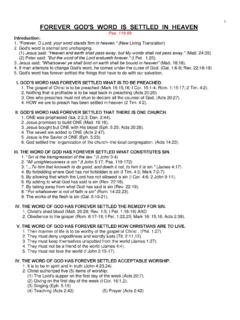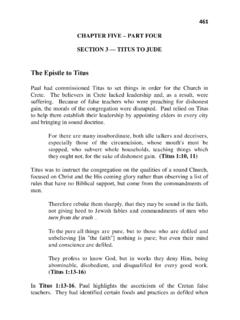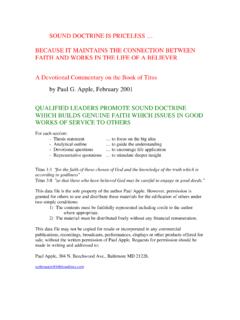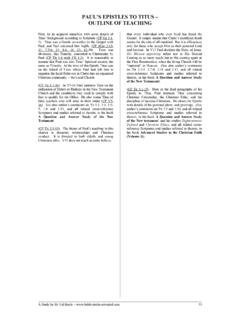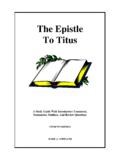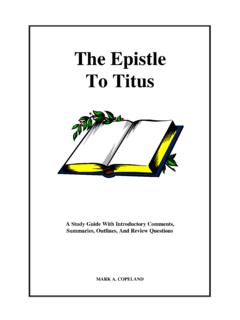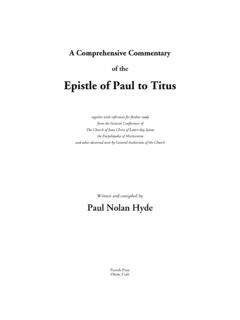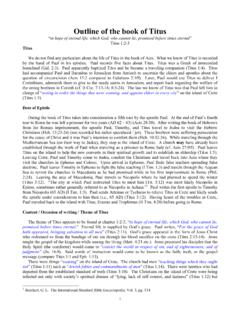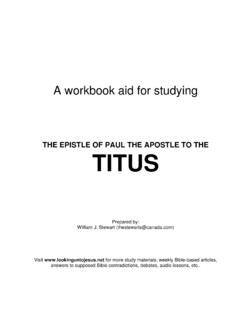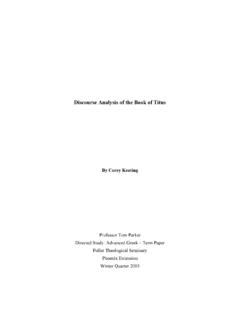Transcription of The Epistle of Paul to Titus
1 The Epistle of Paul to Titus By Donald Townsley *(This book may be copied and reproduced UNEDITED for personal and classroom use. Please give credit to the author Donald Townsley when used for any purpose.) 2 The Epistle of Paul to Titus LESSON ONE INTRODUCTION 1. Paul wrote this letter to Titus ( Titus 1: 1, 4). a. Titus was a Gentile (Gal. 2:3; 2 Cor. 8:16 - 17, 23; 2 Tim. 4:10). 2. Paul was "at liberty" when he wrote this letter, so this was before his final imprisonment. 3. The date would be about 65 A. D. a. This letter was written after I Timothy. 4. Titus was a convert of Paul ( Titus 1:4) --"mine own son after the common faith". a. A COMMON salvation (Jude 3). (1) A COMMON God, our Savior (Tit.)
2 1:3). (2) A COMMON Lord, Jesus Christ our Savior (Tit. 1:4). (3) A COMMON Comforter, the Holy Spirit (John 14:26; 16:13; Tit. 3:5) -- the giver of revelation (II Pet. 1: 20 - 21; I Cor. 2: 9 - 13). (4) A COMMON Baptism (Eph. 4:5). (5) A COMMON Grace, God's grace "that bringeth salvation hath appeared to all men" (Tit. 2:11; Gal. 1:15; 2 Thess. 2:14). (6) A COMMON Hope ( Titus 1: 2; 3:7). 5. In this letter Paul wants Titus to come to Nicopolis; he (Paul) planned to spend the winter there ( Titus 3:12). a. Nicopolis was on the Adriatic Sea. 6. Paul was going to send Artemas or Tychicus to Crete ( Titus 3:12). a. Crete was a large island in the Mediterranean Sea. b. Jews from Crete were in Jerusalem on Pentecost (Acts 2: 11).
3 7. Why Paul had left Titus in Crete ( Titus 1: 5 - 16): a. To "set in order the things that are wanting" ( Titus 1:5). b . To appoint elders in every city ( Titus 1:5). (1) Every congregation was to have elders (Acts 14:23). c. To stop the false teachers ( Titus 1: 10 - 14). (1) Elders must also do this ( Titus 1:9). 3 8. The situation of the church in Crete: a. The government of the church needed to be "set in order" ( Titus 1:5). (1) Qualifications of elders taught. b. False teachers and their teaching needed to be corrected ( Titus 1: 10 - 16; 3: 9 - 11). c. They needed to be grounded in "sound doctrine" ( Titus 2:1). d. They needed to be stirred to diligence in good works ( Titus 3: 1; 1:16; 2:14; 3:8).
4 E. They needed to be taught to live godly lives ( Titus 2: 11 - 13; 3: 2 - 8). f. They needed to be taught good citizenship ( Titus 3: 1 - 2). I. GENERAL THEME OF THIS LETTER -- Titus 2:1: "Speak the things which are proper for sound doctrine:" (NKJV); "Teach what is in accord with sound doctrine;" (NIV). 1. The source of sound doctrine (Tit. 1: 1 - 4): a. God's word ( Titus 1: 3). 2. The means of furthering sound doctrine: a. "But speak thou the things which become sound doctrine:" ( Titus 2:1; 1:3) b. The appointment of qualified elders to oversee the function of the church (Tit. 1: 5 - 9). c. The necessity of exposing and stopping teachers of false doctrine (Tit. 1: 10 -12). (1) Their mouths were to be stopped (Tit.)
5 1:11). (2) They were to be rebuked sharply (Tit. 1:13). (3) They were "abominable, and disobedient, and unto every good work reprobate." (Tit. 1: 15 - 16). d. God's grace provided salvation ( Titus 2: 11 -12). 3. The responsibilities of Titus as a gospel preacher (and the responsibility of every gospel preacher): a. To "set in order the things that are wanting, and ordain elders in every city," ( Titus 1:5; Acts 14:23). b. To "speak thou the things which become sound doctrine" ( Titus 2:1). (1) The duties of aged men (Tit. 2:2). (2) The duties of aged women (Tit. 2: 3 - 5). (3) The duties of young women (Tit. 2: 4 - 5). (4) The duties of young men ( Titus 2:6). c. To be "a pattern of good works" ( Titus 2: 7 - 8).
6 4 (1) He was to "mirror forth" sound doctrine in his life and in his teaching. (2) His teaching would be useless unless it was enforced by the power of a holy example. (a) There must be harmony between his teaching and his life ( I Tim. 4:12). (3) He was to teach all these things "with all authority" (Tit. 2:15). (4) He was to teach the duty of submission to constituted authority (Tit. 3:1; Rom. 13: 1 - 7). d. He was to have the right deportment toward all men (Tit. 3:2). (1) To speak evil of no man. (2) To be no brawler. (3) To be gentle. (4) To show meekness (Gal. 5:22). e. He was to set forth God's love and grace that provided for our salvation through Jesus Christ (Tit.)
7 3: 4 - 7). f. He was to "affirm constantly, that they which have believed in God, might be careful to maintain good works" (Tit. 3:8). g. He was to "avoid foolish questions, and genealogies, and contentions, and strivings about the law; for they are unprofitable an vain" (Tit. 3:9). h. Paul tells Titus how to treat a divisive man (Tit. 3: 10 - 11). 4. The main doctrinal themes of the book: a. The doctrine of God: (1) God is eternal (Tit. 1:2). (2) He gives grace and peace (Tit. 1:4; 2: 11- 12). (3) He is our Savior (Tit. 3:4). b. The doctrine of Christ: (1) He is our Savior (Tit. 1:4; 2:13). (2) His deity (Tit. 2:13). c. The doctrine of the Holy Spirit (Tit. 3:5) : (1) He is the agent of regeneration (John 3:5; Mark 16:16; I Cor.
8 12:13). d. The doctrine of the world of God, the gospel: (1) He manifested His word through preaching (Tit. 1:3; I Cor. 1:21; Mark 16:15 - 16). (2) It is "the faithful word" (Tit. 1: 9). 5 (3) It is "sound doctrine" (Tit. 2: 1). (4) It is doctrine (Tit. 2:7). (5) It is called "the doctrine of God" (Tit. 2:10). (6) It is called "the truth" (Tit. 1:14). e. The doctrine of the church -- local (Tit. 1: 5 - 9). f. The doctrine of grace: (1) Titus 2: 11 -12. (2) Titus 3: 7; 3:5. g. The doctrine of good works (Tit. 3:8; 3;1). h. The doctrine that the individual is to work in order to have money for good works (Tit. 3: 14). QUESTIONS ON CHAPTER ONE 1. When was the letter to Titus written?
9 _____ 2. Who wrote this letter? _____ 3. To whom was this letter written? _____ 4. Where was Titus when this letter was written to him? _____ 5. What was Titus to do in Crete? (vs. 5) _____ _____ MONARCHY The church is a Kingdom and Christ is King (Col. 1:13). He rules through Elders. The government of the church is a theocracy. A Theocracy is a government where man carries out God's will. Elders have mandate from Christ to rule His people (Acts 20:28; 14:23; Titus 1:5). Elders are Holy Spirit made (Acts 20:28). The people are to obey elders (Heb. 13:17; I Tim. 5:17; Heb. 13:7; I Thess. 5:12). When elders rule, Christ is ruling. One question that is rarely asked in the selection of Elders is: "Do these men have any Leadership?
10 " A shepherd is a leader ( I Tim. 3:4 - 5). Question: What can happen to a congregation and to preachers who go for years with an eldership? 6 6. List the qualifications of an elder as given in Titus chapter one. (Some qualifications are absolute and some are relative. One possesses these in degrees -- some positive and some negative.) (1) _____ (2) _____ (3) _____ (4) _____ (5) _____ (6) _____ (7) _____ (8) _____ (9) _____ (10) _____ (11) _____ (12) _____ (13) _____ (14) _____ (15) _____ 7. List the qualifications of an elder that are given in I Timothy 3: 1 - 7: (1) _____ (2) _____ (3) _____ (4) _____ (5) _____ (6) _____ (7) _____ (8) _____ (9) _____ (10) _____ (11) _____ (12) _____ (13) _____ 7 (14) _____ (15) _____ (16) _____ (17) _____ (18) _____ 8.
